|
|
|
Sort Order |
|
|
|
Items / Page
|
|
|
|
|
|
|
| Srl | Item |
| 1 |
ID:
102318
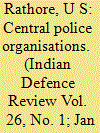

|
|
|
| 2 |
ID:
176581
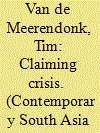

|
|
|
|
|
| Summary/Abstract |
This article discusses local expressions of crisis in Beed district, central Maharashtra. Both in public and academic discourse crisis has become the term of choice for the many structural deficiencies which make agriculture an increasingly precarious livelihood in India. While most voices subscribe to the explanation that the current state of distress can be attributed to the unprofitability of agriculture, a wide range of structural explanations are suggested as to why this might be the case. Consequently, in some debates agricultural crisis runs the risk of moving the experiences, agency and postionalities of those imagined to be living through its consequences to the background. This paper counterbalances such causal explanations by empirically delving into the imaginaries of agricultural crisis as they are articulated, negotiated and employed by farmers in Maharashtra. Based on twelve months of ethnographic research, the paper examines how ideas of crisis are entangled with colloquial understandings by taking experiences of ‘tension’, an Anglicised term used to express feelings akin to stress, as object of inquiry. I argue that by claiming crisis through invoking feelings of tension farmers mobilise a plurality of meanings, narratives and moral evaluations about what is wrong with agriculture in this part of India.
|
|
|
|
|
|
|
|
|
|
|
|
|
|
|
|
| 3 |
ID:
131144
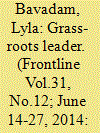

|
|
|
|
|
| Publication |
2014.
|
| Summary/Abstract |
Gopinath Pandurang Munde (1949-2014) was a simple man comfortable in his rural roots. A stranger to Machiavellian Political machination, he owed his success to sheer determination.
|
|
|
|
|
|
|
|
|
|
|
|
|
|
|
|
| 4 |
ID:
182855
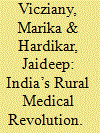

|
|
|
|
|
| Summary/Abstract |
This article explores the potential conflict between allopathic (‘Western’) medicine and rural beliefs in village goddesses, given that each demands blood for diagnostic purposes and sacrifices, respectively. Our objective is to understand the experiences and attitudes of rural residents to blood tests, blood donations and blood transfusions. We explore the specific question of the extent to which poor villagers in Wardha district, Maharashtra, might be supportive of or opposed to point-of-care blood testing at their doorsteps. We began by asking them about their religious practices, including the sacrifice of animals and offerings of blood to deities. Such values could affect their perspectives on human blood and allopathic medicine. After that, we asked whether they had any fears about modern medical treatments and technologies—such fears might be driven by anxieties about angering goddesses if human blood was used for non-sacred purposes. Our investigations took us into an inquiry about villagers’ experiences with hospitals. We came to realise that for villagers, despite the costs of hospital diagnosis and treatment, hospitalisation had become a source of new knowledge about blood. And, finally, we asked villagers what they thought about the value of point-of-care blood testing at their doorstep. We were told that the high cost of hospital treatment means that villagers support technologies that can be used at their doorstep and work towards improving their health and longevity.
|
|
|
|
|
|
|
|
|
|
|
|
|
|
|
|
| 5 |
ID:
170002
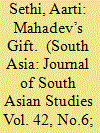

|
|
|
|
|
| Summary/Abstract |
In October 2016, protests erupted across southern India opposing a Supreme Court judgement banning an annual agricultural festival featuring jousts between men and bulls. The Court ruled the contests as infringing animal rights. Rural constituencies rallied behind the festival as a customary practice and symbol of agrarian culture. This essay suggests that the conflict between the two constituencies turns on whether animals are legal subjects or social persons. I analyse this festival-complex in Maharashtra to show that the ritual imagines animals not as rights-bearing species, but as members of the agricultural community. The rite does not disavow violence, rather it embeds its symbolisation within familial and productive relations between people and bullocks.
|
|
|
|
|
|
|
|
|
|
|
|
|
|
|
|
| 6 |
ID:
154557
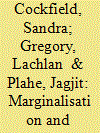

|
|
|
|
|
| Summary/Abstract |
India is in the grip of an agrarian crisis. Economic, social, environmental and political forces have adversely affected the relationship between the small-scale primary producer and the production process. In the context of this crisis, traditional knowledge-inspired food systems have given rise to ‘islands of success’ that have allowed small and marginal farmers to reclaim their livelihoods across the country. In this paper, we analyse three different islands of success using an agro-ecological framework, arguing that such islands of success based on traditional knowledge are becoming an increasingly necessary approach to agriculture. However, political will, political engagement and effective policies that support traditional knowledge in agriculture are required for these islands of success to become waves of change.
|
|
|
|
|
|
|
|
|
|
|
|
|
|
|
|
| 7 |
ID:
169028
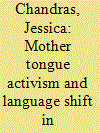

|
|
|
|
|
| Summary/Abstract |
This article outlines the extracurricular work of education and language revitalization by two non-governmental organizations (NGOs) in Pune, a city in the western Indian state of Maharashtra. It demonstrates how these NGOs respond to anxieties and fears of language shift, language death, and social change in ways that fill a gap in how connections of language to society are addressed in the formal education system in Pune. These NGOs recreate structures of hierarchies among socioeconomic classes in their work of language preservation, assigning to lower classes the task of maintaining Marathi as an everyday language and delegating the promotion of Marathi “high culture” forms such as the arts to the upper classes. The article illuminates ways in which Marathi use and language ideologies shape socioeconomic class identifications and how ideologies about language and language use take different forms based on needs defined through a socioeconomic class lens.
|
|
|
|
|
|
|
|
|
|
|
|
|
|
|
|
| 8 |
ID:
145382
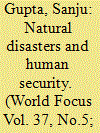

|
|
|
|
|
| Summary/Abstract |
The toll of human death and property damage has dramatically increased, far outstripping the coping capacities of the local, national, and even global assistance efforts. Natural disasters thus elicit taking a fresh look at the definition of security itself. Disasters can provide a measure of the preparedness and integrity of the affected society, showing both the adherence by the people to sound building and land use codes and the avoidance by the government of corruption and ineptitude.
|
|
|
|
|
|
|
|
|
|
|
|
|
|
|
|
| 9 |
ID:
119287
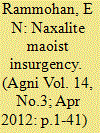

|
|
|
| 10 |
ID:
124223
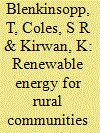

|
|
|
|
|
| Publication |
2013.
|
| Summary/Abstract |
The desire for universal access to modern energy and the use of renewable energy technologies (RETs) as a means of delivering low carbon solutions are driven by several local and global factors, including climate change, population increase and future energy security. Social attitudes are a major challenge to overcome in order to successfully introduce low carbon technologies as a sustainable alternative to more traditional means of energy provision. It becomes a challenge to educate the target population in order to counteract any negative preconceptions or scepticisms in using these technologies which can have adverse effect upon their viability and long term success. This work presents the results of a rural energy survey conducted in the Indian state of Maharashtra. The survey highlights the opportunities and attitudes of these rural communities towards sustainable modern energy services and the technologies used to deliver them. Results from the survey show that there is interest in using sustainable or renewable technologies for energy provision and suggest that cost, reliability and ease of use are more important factors than the environmental benefits. A suggestion for a way to improve RET adoption in rural communities is also presented based on the results of this study.
|
|
|
|
|
|
|
|
|
|
|
|
|
|
|
|
| 11 |
ID:
164045
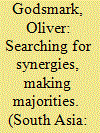

|
|
|
|
|
| Summary/Abstract |
This paper re-examines the demand for Pakistan as part of a wider ‘federal moment’ in India by addressing its connections with the contemporaneous calls for Samyukta Maharashtra in the context of the Cabinet Mission of spring/summer 1946. It highlights how the twinned processes of democratisation and provincialisation during the inter-war years informed these demands. Both Muslim and Maratha representatives looked to locate and create autonomous political spaces that would better secure their political representation. Their demands exemplified a shift away from a commensurative logic expressed through separate representation in the legislatures towards support for majority rule at the provincial level.
|
|
|
|
|
|
|
|
|
|
|
|
|
|
|
|
| 12 |
ID:
148845
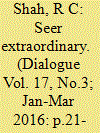

|
|
|
|
|
| Summary/Abstract |
The information available about Nisargadutt Maharaj is inadequate. He
was born in 1897 in a poor Brahmin family. His father Shiv Ram Pant
was a farmer at Kandolgaon – a small village in Ratnagiri district of
Maharashtra. As he himself tells us in his conversations, “My destiny
was to be born a simple commoner, with little formal education.” The
reader is advised to read a book which is a spiritual classic called ‘I am
That: Talks with Sri Nisargadutt Maharaj” – translated from the Marathi
tape-recordings by Maurice Frydman; revised and edited by Sudhakar
Dikshit. To quote the editor himself,”
|
|
|
|
|
|
|
|
|
|
|
|
|
|
|
|
| 13 |
ID:
054702
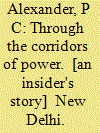

|
|
|
|
|
| Publication |
New Delhi, Harper Collins Publishers India, 2004.
|
| Description |
480p.Hbk
|
| Standard Number |
817223550X
|
|
|
|
|
|
|
|
|
|
|
|
Copies: C:1/I:0,R:0,Q:0
Circulation
| Accession# | Call# | Current Location | Status | Policy | Location |
| 048848 | 920.9320/ALE 048848 | Main | On Shelf | General | |
|
|
|
|
| 14 |
ID:
190723


|
|
|
|
|
| Summary/Abstract |
Critiques of vulgarity, sexuality and class featured prominently in the social, cultural and intellectual life of post-Independence India. This article focuses on the discourse of chumban bandi (banning kissing) in the 1950s and 1960s Maharashtra and analyses how it became a particularly unique index of heightened transgressive pleasure. I situate this discourse within a larger public debate, where dominant caste middle-class elites took upon the responsibility to shepherd supposedly recalcitrant dominated castes and low-class masses towards decency, civilized action and citizenship. Many elites energetically worked on their ideology, which was rooted in high-caste, middle-class and patriarchal values to create Marathi manus and nation. Drawing upon hitherto neglected Marathi language texts, I show how elites policed the kiss to both ban on-screen kissing and paradoxically harness its energy to engage in the politics of Marathikaran (creating Marathi regional identity) and create a new Marathi identity as modern, moral and decent.
|
|
|
|
|
|
|
|
|
|
|
|
|
|
|
|
| 15 |
ID:
161151
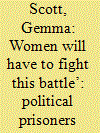

|
|
|
|
|
| Summary/Abstract |
During India’s infamous period of Emergency (1975–1977), Indira Gandhi’s government criminalised opposition and used preventive detention legislation extensively to repress dissent. Existing scholarship on this policy and on the Emergency more broadly pays little attention to women’s experiences. This paper draws on a unique collection of letters sent to and from female political prisoners in Maharashtra, exploring their experiences of incarceration under this regime. It offers new insights into the scale on which authorities detained women in this state and highlights ways that these political prisoners actively resisted Emergency rule. The paper also challenges the idea that the prison was an entirely repressive space for the Emergency’s detenues. These letters document attempts to exert agency over constructions of the prison space, highlight its permeable boundaries and reveal lively communities and cultures of resistance.
|
|
|
|
|
|
|
|
|
|
|
|
|
|
|
|
|
|
|
|
|